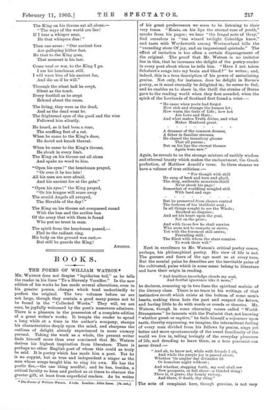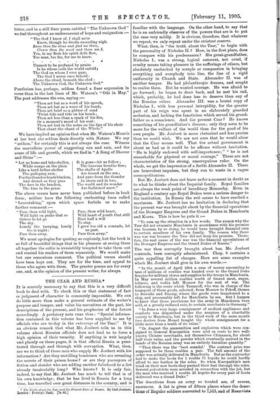MR, WATSON does not despise " lapidarian toil," as he
tells the reader in his lines " To a Slovenly Versifier." In the new edition of his works he has made several alterations, even in his greater poems, changes which tend undoubtedly to perfect the original. The two volumes before us are not large, though they contain a good many poems not to be found in the " Collected Works." They will, we are sure, be joyfully welcomed by the poet's numerous admirers. There is a pleasure in the possession of a complete edition of a great writer's works. It tempts the reader to spend a long while at a time in the author's company, stamps his characteristics deeply upon the mind, and sharpens the outlines of delight already experienced in more cursory perusal. Taking the work as a whole, the present writer finds himself more than ever convinced that Mr. Watson derives his highest inspiration from literature. There is perhaps no other English poet of whom this could as truly be said. It is poetry which has made him a poet. Yet he is no copyist, but as true and independent a singer as the men whose songs taught him to sing his own. He has the poetic fire,—the one thing needful; and he has, besides, a critical faculty so keen and perfect as at times to obscure the greater gift, at least from superficial readers. As he writes • TIM Poems of William Watson. 2 vols. London: john Lan.. Las. net.J
of his great predecessors we seem to be listening to their very tones. " Keats, on his lips the eternal rose of youth," speaks from his pages ; we hear "the frugal note of Gray," find ourselves in " the wizard twilight Coleridge knew," and taste with Wordsworth among Westmorland hills the "exceeding store Of joy, and an impassioned quietude." The effect of imitation is too often a certain disparagement of the original. The proof that Mr. Watson is. no imitator lies in this, that he increases the delight of the poetry-reader in every poet about whom he tells him. "Have I not taken Schubert's songs into my brain and blood ?" he writes ; and, indeed, this is a true description of his power of assimilating genius. Not only, for instance, does he delight in Burns's poetry, as it must eternally be delighted in; he seems to feel, and he enables us to share in, the thrill the strains of Burns gave to the reading world when they first sounded, when the spirit of the Lowlands of Scotland first found a voice :-
" He came when poets had forgot
How rich and strange the human lot ; How warm the tints of Life ; how hot Are Love and Hate ; And what makes Truth divine, and what Makes Manhood great.
• A dreamer of the common dreams, A fisher in familiar streams, He chased the transitory gleams That all pursue ; But on his lips the eternal themes Again were new."
Again, be reveals to us the strange mixture of earthly wisdom and ethereal beauty which makes the enchantment, the Greek perfection, of Matthew Arnold's verse. In three stanzas we have a volume of true criticism :— "For though with skill He sang of beck and tarn and ghyll, The deep, authentic mountain-thrill Ne'er shook his page !
Somewhat of worldling mingled still With bard and sage.
But he preserved from chance control The fortress of his 'stablisht soul ;
In all things sought to see the Whole ;
Brooked no disguise; And set his heart upon the goal, Not on the prize ; And with those few he shall survive Who seem not to compete or strive, Yet with the foremost still arrive, Prevailing still : The Elect with whom the stars connive To work their will."
Next in excellence to Mr. Watson's critical poetry cornea, perhaps, his philosophical poetry. His view of life is sad. The guesses and fears of the age meet us at every turn. But the mental pains he describes are the inevitable pains of the cultivated, pains which in some sense belong to literature and have their origin in reading.
"And fruitless knowledge clouds my soul, And fretful ignorance irks it more,"
he declares, summing up in two lines the spiritual malaise of the literary class. There is no trace in his writings of that instinctive revolt which exists at the bottom of some men's hearts, making them hate the past and suspect the figure, and having little to do with words or creeds or theories. Mr. Watson, though in some charming verses called " World- Strangeness" he laments with the Psalmist that, not knowing " whether guest or captive," he feels himself a sojourner upon earth, thereby expressing, we imagine, the intermittent feeling of every man divided from his fellows by genius, sings yet better and more spontaneously of the sweet familiarity of the world we live in, telling lovingly of the everyday pleasures of life, and dreading to leave them, as a true pessimist can never dread :— "And ah, to know not, while with friends I sit, And while the purple joy is passed about, Whether 'tie ampler day divinelier lit Or homeless night without ; And whether, stepping forth, my soul shall see New prospects, or fall sheer—a blinded thing! There is, 0 grave, thy hourly victory,
And there, 0 death, thy sting."
The note of complaint here, though genuine, is not very
bitter, and in a still finer poem entitled " The Unknown God " we feel throughout an undercurrent of hope and resignation :—
"The God I know of, I shall ne'er
Know, though he dwells exceeding nigh. Raise thou the stone and find me there,
Cleave thou the wood and there am I. Yea, in my flesh his spirit doth flow, Too near, too far, for me to know.
..... • .
Unmeet to be profaned by praise Is he whose coils the world enfold= The God on whom I ever gaze, The God I never once behold : Above the cloud, beneath the clod : The Unknown God, the Unknown God."
Pantheism has, perhaps, seldom found a finer expression in verse than in the last lines of Mr. Watson's " Ode in May." The poet addresses the sun, saying :— " Thou art but as a word of his speech, Thou art but as a wave of his hand; Thou art brief as a glitter of sand 'Twixt tide and tide on his beach ; Thou art less than a spark of his fire, Or a moment's mood of his soul : Thou art lost in the notes on the lips of his choir That chant the chant of the Whole."
We have implied an opinion that when Mr. Watson's Muse is at her best she seldom deals directly with Nature. We say "seldom," for certainly this is not always the case. Witness the marvellous power of suggesting sun and rain, and the sense of life and growth, which we find in " A Song of Shower and Shine" :— " Lot us home and take shelter, While romps on the plain Like a herd helter-skelter The galloping rain ;
For the thunderclouds blacken, And drench as they pass The deer in the bracken, The kind in the grass.
The above verses have never been published before in book form ; neither have the following enchanting lines called " Leavetaking," upon which space forbids us to make further comment :-
"Pass, thou wild light, Pass, thou wild heart,
Wild light on peaks that so Wild heart of youth that still Grieve to let go Hast half a will The day. To stay.
Lonely the tarrying, lonely I grow too old a comrade, let too is night : us part.
Pass thou away. Pass thou away."
We must apologise for quoting so copiously, but the book is so full of beautiful things that in his pleasure at seeing them all together the critic is irresistibly tempted to take them out and remind his readers of them separately. We would make but one censorious comment. The political verses should have been kept out. They are for the time, and appeal to those who agree with them. The greater poems are for every one, and, in the opinion of the present writer, for always. It is gone—let us follow ; The heavens breathe free; The shafts of Apollo Are loosed on the sea ; And pure from the thunder In sheen and in hue, The world and its wonder Are fashioned anew."







































 Previous page
Previous page